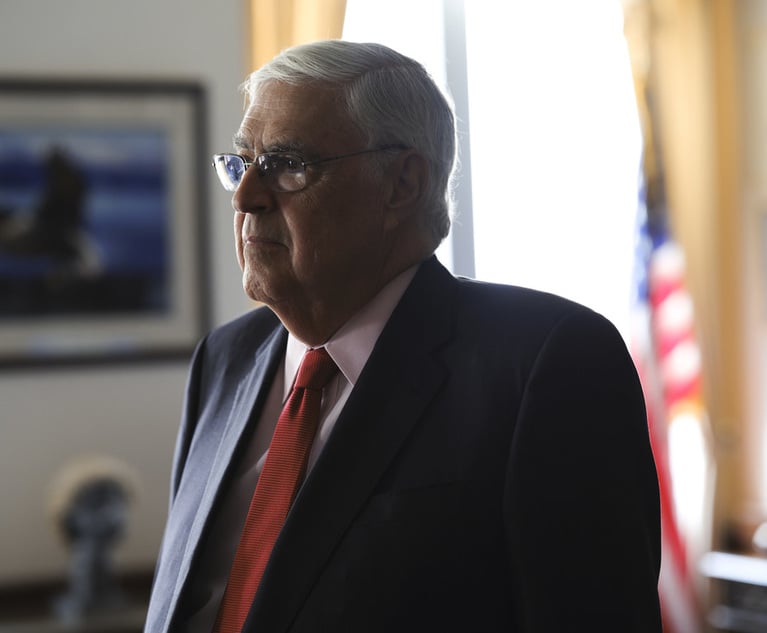 (Photo: Rawpixel.com/Shutterstock.com)
(Photo: Rawpixel.com/Shutterstock.com)Will Private Equity's Diversity Problem Improve as Clients Grow?
The private equity space is rapidly growing. Will the diversity infrastructure come with it? And will law firm private equity practices follow?
August 22, 2019 at 11:21 AM
4 minute read
The original version of this story was published on The American Lawyer
The private equity world has a long-standing reputation for lacking diversity, and the same goes for the legal teams that staff private equity matters.
A recent survey by data provider Preqin found that 5.2% of private equity firm board seats are occupied by women. Minority-owned firms account for 3.9% of all private equity firms.
On the law firm side, private equity practices have long been perceived as dominated by white men, even as other institutional clients and Fortune 500 companies continue to diversify.
"I can name, like, four black fund lawyers nationwide," said Fried, Frank, Harris, Shriver & Jacobson partner Matt Howard, who began his career as a private equity lawyer at Cleary Gottlieb Steen & Hamilton in 2004.
"Many of the small houses that are relatively successful have very small partnerships, [made up of] a handful of individuals that tend to be white," Howard, who is black, added. "People form relationships and business is developed with the guy who you went to college with or who you know from the golf club. There's an unintentional exclusionary effect."
But there are some indications that the dynamic may be changing.
PricewaterhouseCoopers expects that the assets under management in the private equity industry will more than double from $4.7 trillion in 2016 to $10.2 trillion by 2025. And with the increase in money managed has come an increase in head count. Blackstone, for example, employs more than 250 private equity professionals.
At the biggest funds, that growth has come with diversity infrastructure—inclusion executives, diversity plans. Many believe the discussion around private equity diversity will only grow with expansion of the industry.
The Carlyle Group, one of the world's largest private equity funds, has a written diversity policy and created a diversity and inclusion council in 2013. In 2018, Carlyle appointed Kara Helander, who was a diversity executive at BlackRock for a decade, as the firm's first chief inclusion and diversity officer.
"Year to date, out of our hires in the U.S., 59% have either been female, black, Hispanic, Native American or Pacific Islander," Helander said. "Our team set a goal across our companies globally to have at least one diverse board member within two years of ownership."
Carlyle has also begun requesting from each of its law firms a copy of the firm's American Bar Association model diversity survey. The fund wants hard data to show its legal teams are addressing the issue, much like the corporate clients who have been clamoring for increasingly diverse legal representation.
The question many are asking now is whether the increasing focus on diversity will affect the composition of the world's top private equity practices, which stand to make a killing off of the private equity boom.
The private equity world has considerable sway over the bottom lines and hiring decisions of the world's top law firms. The firms with the two busiest private equity teams, Kirkland & Ellis and Latham & Watkins, hold the No. 1 and No. 2 spots, respectively, on the Am Law 100.
Erica Berthou, a senior investment funds partner at Kirkland & Ellis, is optimistic. She's noticed an uptick of women on private equity in-house legal teams, which she believes will bring in more women on the law firm side.
"Maybe because I'm a glass-half-full kind of person, I'm very optimistic about greater female participation in private equity practices, especially as those at the top become increasingly diverse," she said.
Whereas before there were almost no senior women in private fund practices, Berthou and her peers such as Kirkland private equity partner Jennifer Perkins are providing a template for women looking to advance in the space, she said. Changing attitudes and gender parity regarding parental leave and caregiver status as well as a more collaborative, team-oriented approach to modern law have also helped women break into the private equity world.
"As a woman coming into a law firm, you look for diversity and role models," she said. "And because there hasn't been senior-level female diversity in private equity practices until fairly recently, there hasn't been a natural pool of female role models."
Howard is similarly optimistic.
"As these organizations grow, they necessarily become more institutionalized," he said. "You can't run a 400-person organization the way you run a 15-person organization. The expectations on them, through visibility, become greater."
|Read More
This content has been archived. It is available through our partners, LexisNexis® and Bloomberg Law.
To view this content, please continue to their sites.
Not a Lexis Subscriber?
Subscribe Now
Not a Bloomberg Law Subscriber?
Subscribe Now
NOT FOR REPRINT
© 2024 ALM Global, LLC, All Rights Reserved. Request academic re-use from www.copyright.com. All other uses, submit a request to [email protected]. For more information visit Asset & Logo Licensing.
You Might Like
View All
Stock Trading App Robinhood Hit With Privacy Class Action 1 Month After Alleged Data Breach

Congress and Courts Are Considering Litigation Financing: Is Disclosure Imminent?
8 minute read
Auditor Finds 'Significant Deficiency' in FTC Accounting to Tune of $7M
4 minute read
'A World of Credit': Ex-FTX Executive Gary Wang Sentenced to Time Served Following Cooperation
Trending Stories
- 1Judicial Ethics Opinion 24-68
- 2Friday Newspaper
- 3Judge Denies Sean Combs Third Bail Bid, Citing Community Safety
- 4Republican FTC Commissioner: 'The Time for Rulemaking by the Biden-Harris FTC Is Over'
- 5NY Appellate Panel Cites Student's Disciplinary History While Sending Negligence Claim Against School District to Trial
Who Got The Work
Michael G. Bongiorno, Andrew Scott Dulberg and Elizabeth E. Driscoll from Wilmer Cutler Pickering Hale and Dorr have stepped in to represent Symbotic Inc., an A.I.-enabled technology platform that focuses on increasing supply chain efficiency, and other defendants in a pending shareholder derivative lawsuit. The case, filed Oct. 2 in Massachusetts District Court by the Brown Law Firm on behalf of Stephen Austen, accuses certain officers and directors of misleading investors in regard to Symbotic's potential for margin growth by failing to disclose that the company was not equipped to timely deploy its systems or manage expenses through project delays. The case, assigned to U.S. District Judge Nathaniel M. Gorton, is 1:24-cv-12522, Austen v. Cohen et al.
Who Got The Work
Edmund Polubinski and Marie Killmond of Davis Polk & Wardwell have entered appearances for data platform software development company MongoDB and other defendants in a pending shareholder derivative lawsuit. The action, filed Oct. 7 in New York Southern District Court by the Brown Law Firm, accuses the company's directors and/or officers of falsely expressing confidence in the company’s restructuring of its sales incentive plan and downplaying the severity of decreases in its upfront commitments. The case is 1:24-cv-07594, Roy v. Ittycheria et al.
Who Got The Work
Amy O. Bruchs and Kurt F. Ellison of Michael Best & Friedrich have entered appearances for Epic Systems Corp. in a pending employment discrimination lawsuit. The suit was filed Sept. 7 in Wisconsin Western District Court by Levine Eisberner LLC and Siri & Glimstad on behalf of a project manager who claims that he was wrongfully terminated after applying for a religious exemption to the defendant's COVID-19 vaccine mandate. The case, assigned to U.S. Magistrate Judge Anita Marie Boor, is 3:24-cv-00630, Secker, Nathan v. Epic Systems Corporation.
Who Got The Work
David X. Sullivan, Thomas J. Finn and Gregory A. Hall from McCarter & English have entered appearances for Sunrun Installation Services in a pending civil rights lawsuit. The complaint was filed Sept. 4 in Connecticut District Court by attorney Robert M. Berke on behalf of former employee George Edward Steins, who was arrested and charged with employing an unregistered home improvement salesperson. The complaint alleges that had Sunrun informed the Connecticut Department of Consumer Protection that the plaintiff's employment had ended in 2017 and that he no longer held Sunrun's home improvement contractor license, he would not have been hit with charges, which were dismissed in May 2024. The case, assigned to U.S. District Judge Jeffrey A. Meyer, is 3:24-cv-01423, Steins v. Sunrun, Inc. et al.
Who Got The Work
Greenberg Traurig shareholder Joshua L. Raskin has entered an appearance for boohoo.com UK Ltd. in a pending patent infringement lawsuit. The suit, filed Sept. 3 in Texas Eastern District Court by Rozier Hardt McDonough on behalf of Alto Dynamics, asserts five patents related to an online shopping platform. The case, assigned to U.S. District Judge Rodney Gilstrap, is 2:24-cv-00719, Alto Dynamics, LLC v. boohoo.com UK Limited.
Featured Firms
Law Offices of Gary Martin Hays & Associates, P.C.
(470) 294-1674
Law Offices of Mark E. Salomone
(857) 444-6468
Smith & Hassler
(713) 739-1250








